Photographs: Reuters M R Venkatesh
It is raining freebies in Tamil Nadu once again. If Thalaivar (Tamil Nadu chief minister and DMK chief M Karunanidhi) does not give you, Amma (AIADMK supreme J. Jayalalalithaa) will.
If Amma promises anything free, Thalaivar will get you the same twice over. According to political analysts, the tipping point in freebies came during the last state elections, held in 2006.
It is generally believed in political circles that the offer of free televisions and subsidised rice at Rs 2 per kg titled the balance in favour of the then opposition (the Dravida Munnetra Kazhagam), which was voted to office.
Having tasted success, the think-tank within the ruling party sincerely believe whatever be the quality of administration, law and order, growth trajectory of the state, power and water crises, quality of infrastructure, and corruption charges hurled against it by the opposition, they can get away.
Unfortunately, the opposition in office today (the All India Anna Dravida Munnetra Kazhagam) too has come to believe in this idea -- of influencing voters and winning their loyalty through a series of brazen freebie promises.
. . .
How Tamil Nadu's freebie culture is killing its economy
Image: AIADMK chief and former Tamil Nadu chief minister J Jayalalithaa.Photographs: Reuters
In short, elections in Tamil Nadu are all about by freebies; not about anything else. And for both the ruling party and the opposition what matters today is not the performance of the government but intelligent packaging of freebies.
In the process little do the voters in Tamil Nadu realise that freebies are nothing but corrupt electoral malpractices brazenly carried out using the revenues of the state. Neither do they realize that in real life there are no free lunches.
Surely, someone somewhere has to foot the bill. More importantly, as the focus is on delivering such freebies, the overall administration suffers.
The cost: The state is caught in a debt spiral that is now believed to exceed Rs 100,000 crore (Rs 1 trillion).
What is appalling is that rough calculations reveal that the freebies announced could well cost anywhere between Rs 50,000 and 250,000 crores (Rs 500 billion to Rs 2.50 trillion) -- yes! -- to the exchequer; so much so that, given the precarious state of the finances of the state, analysts have termed these promises as impossible to be delivered.
. . .
How Tamil Nadu's freebie culture is killing its economy
Photographs: Reuters
Some have termed this as a race to the bottom. It is in this context that one is reminded of Gresham's law: When the good circulates with the bad, bad drives out the good.
When ideology is reduced to rhetoric; economics is buried fathoms deep
I was privileged to attend a lecture of Gujarat Chief Minister Narendra Modi in Chennai a couple of years back. Never to miss a chance to run down his political opponents, Modi pointed out something very interesting.
The Congress Party -- the opposition in Gujarat -- proposed to provide freebies to the electorate in Gujarat too so as to woo the electorate there, in light of the successful experiment in Tamil Nadu.
The response to this by Modi is telling and explains why he remains a potent political force even in distant Tamil Nadu. When questioned by scribes as to what he proposes to give as freebies if elected, Modi retorted that he would slap notices on all tax defaulters!
. . .
How Tamil Nadu's freebie culture is killing its economy
Image: Voters in Tamil Nadu.Photographs: Rediff Archive
It is easy to dismiss the same as typical arrogance or bravado by Modi. Yet, Modi won. And to me it is a tribute to the people of Gujarat as much as it is to the leadership of Modi.
And like the adage, I believe, it is the ordinary people who fashion the thoughts of their leaders, not the other way round.
What worries analysts is that given the competitive game of announcing freebies, it is a matter of time before one of the political parties announces the extension to the mid-day meal scheme available to all school-going children currently to all those who are below the poverty line only to find their political opponents extending it to all households.
'Women liberated from kitchen' could possibly be the slogan. And to liberate men? Well, subsidised liquor could be one option that comes to mind instantly.
Naturally than brings me to the most crucial question: Is Dravidian politics shorn of economics? Does its politics have economics in its calculus? Is its politics rooted in sound economics?
. . .
How Tamil Nadu's freebie culture is killing its economy
Photographs: Reuters
To answer these questions it is important to understand a bit of Dravidian politics as it is practiced today. Surely, it began with some high and lofty ideals and ideology coinciding with our Independence.
Over the next four decades after Independence, it meandered into nothingness. Since then Dravidian politics meant alliterating endlessly in chaste Tamil, expressing sympathy for Sri Lankan Tamils and swearing repeatedly on the greatness of Tamil language.
Dravidian ideology loosely mirroring communism rested on the following three pillars -- atheism, anti-Hindi agitation and propagating the ideals of a casteless society.
Today, all Dravidian parties are floundering on all the three pillars. Leaders are known to secretly consult astrologers, occultists and carry out prayers at specified temples at specified times.
That is not all -- anti-Hindi stance is only for the cadre. But in most cases, their children can read write and speak in Hindi. So much for their anti-Hindi stance!
. . .
How Tamil Nadu's freebie culture is killing its economy
Image: Tamil Nadu deputy chief minister M K Stalin and his brother M K Alagiri.Photographs: Reuters
And as far as the third ideology is concerned, today every major caste in Tamil Nadu has a political party of its own or seeks to have a separate political identity.
Given these highly emotional issues that formed the bedrock of Dravidian politics there was no time for 'Dravidian economics'. No wonder, while Dravidian leaders were high on political rhetoric and rarely talked sensible economics.
Linkage to economics, if at all, was limited to providing freebies, more freebies and even more freebies. 'We understand the hunger of the poor' has been their common refrain.
Consequently, the electorate in Tamil Nadu, particularly since 2006, has been used to getting freebies from the government. In fact, freebies are ingrained into the collective psyche of the people of the state.
If you do not announce freebies, you are not a serious political party, and if you do not seek one, you are not a voter.
. . .
How Tamil Nadu's freebie culture is killing its economy
Apparently, Dravidian politics has been as vacuous as its economics. Dravidian politics for long had prided itself on 'restoring Tamil pride and self-respect of Tamils' (whatever it meant).
Today Tamil pride and self-respect have been reduced to queuing up to get their share of the booty offered by the Dravidian parties as freebies.
But there is a murkier side. Let me elaborate.
The Net impact
Below is the data on the economic parameters of the state between 2006 and 2009.
While the data for 2010 is yet to be put up on the official Web site of the Tamil Nadu government, the accompanying data reveals the precipitous fall in the performance of the state since 2006.
| Tamil Nadu | | | Annual | Annual | Annual | Annual |
| Indicator | Unit | Expression | Mar-06 | Mar-07 | Mar-08 | Mar-09 |
| State Gross Domestic Product at factor cost at constant price (Base=99-00) | % | YoY | 11.89 | 11.29 | 4.41 | 4.55 |
| State Gross Domestic Product at factor cost at constant price: Agriculture, forestry and fishing (Base=99-00) | % | YoY | 11.67 | 12.89 | -7.1 | -2.08 |
| State Gross Domestic Product at factor cost at constant price: Agricuture (Base=99-00) | % | YoY | 9.59 | 14.65 | -7.22 | -2.65 |
| State Gross Domestic Product at factor cost at constant price: Forestry and logging (Base=99-00) | % | YoY | 0.44 | -5.56 | 0.73 | 1.12 |
| State Gross Domestic Product at factor cost at constant price: Fishing (Base=99-00) | % | YoY | 40.33 | 1.97 | -7.9 | 2.93 |
| State Gross Domestic Product at factor cost at constant price: Industry (Base=99-00) | % | YoY | 14.48 | 9.4 | 2.23 | 1.01 |
| State Gross Domestic Product at factor cost at constant price: Mining and quarrying (Base=99-00) | % | YoY | -2.77 | 6.45 | 0.52 | 1.79 |
| State Gross Domestic Product at factor cost at constant price: Manufacturing (Base=99-00) | % | YoY | 16.45 | 11.34 | 4.73 | 1.97 |
| State Gross Domestic Product at factor cost at constant price: Manufacturing registered (Base=99-00) | % | YoY | 21.37 | 11.45 | 4.04 | 1.97 |
| State Gross Domestic Product at factor cost at constant price: Manufacturing unregistered (Base=99-00) | % | YoY | 7.35 | 11.12 | 6.17 | 1.97 |
| State Gross Domestic Product at factor cost at constant price: Elelectricity, gas and water supply (Base=99-00) | % | YoY | -2.77 | -10.23 | -35.49 | -48.29 |
| State Gross Domestic Product at factor cost at constant price: Construction (Base=99-00) | % | YoY | 14.98 | 8.74 | 2.17 | 3.36 |
| State Gross Domestic Product at factor cost at constant price: Services (Base=99-00) | % | YoY | 10.58 | 11.96 | 8.17 | 7.62 |
| State Gross Domestic Product at factor cost at constant price: Trade, hotel and restaurant (Base=99-00) | % | YoY | 13.87 | 12.5 | 10.8 | 3.2 |
| State Gross Domestic Product at factor cost at constant price: Transport, storage and communication (Base=99-00) | % | YoY | 11.62 | 9.58 | 11.55 | 11.07 |
| State Gross Domestic Product at factor cost at constant price: Railways (Base=99-00) | % | YoY | 5.25 | 9.01 | 6.27 | 7.99 |
| State Gross Domestic Product at factor cost at constant price: Transport by other means (Base=99-00) | % | YoY | 9.28 | 4.79 | 6.57 | 4.3 |
| State Gross Domestic Product at factor cost at constant price: Storage (Base=99-00) | % | YoY | 5.91 | 11.61 | 2.52 | -0.61 |
| State Gross Domestic Product at factor cost at constant price: Communication (Base=99-00) | % | YoY | 17.07 | 16.59 | 19.33 | 19.63 |
| State Gross Domestic Product at factor cost at constant price: Finance, insurance, real state and business services (Base=99-00) | % | YoY | 13.09 | 14.1 | 6.79 | 4.98 |
| State Gross Domestic Product at factor cost at constant price: Banking and insurance (Base=99-00) | % | YoY | 16.13 | 20.12 | 6.93 | 6.95 |
| State Gross Domestic Product at factor cost at constant price: Real states, ownership of dwellings and business services (Base=99-00) | % | YoY | 10.26 | 8.21 | 6.64 | 2.84 |
| State Gross Domestic Product at factor cost at constant price: Community services and personal services (Base=99-00) | % | YoY | 3.26 | 10.77 | 3.51 | 14.05 |
| State Gross Domestic Product at factor cost at constant price: Public sdministration and defence (Base=99-00) | % | YoY | 1.06 | 16.48 | 0.64 | 17.57 |
| State Gross Domestic Product at factor cost at constant price: Other services (Base=99-00) | % | YoY | 4.31 | 8.13 | 4.94 | 12.37 |
. . .
How Tamil Nadu's freebie culture is killing its economy
Image: M Karunanidhi.Photographs: Reuters
Virtually on all the three sectors -- agriculture, industry and services -- the state has been witnessing a complete drop in growth rates during this period.
Yet, strangely when national growth rates dominate the national economics and political debates, growth rates at the state level are yet to catch up.
In fact, even the opposition is reticent to point out that the net consequence of this freebie mania has been to completely dynamite the state's administrative machinery which is used only to deliver freebies.
Much as the freebie economics of Dravidian politics has its roots in socialism ('we represent the poor'), the fact remains that several members of the first family of Tamil Nadu have varied business interests.
In fact, from running television channels to civil aviation, from cinema to newspaper, the business empire of these members is truly impressive and its rise spectacular.
. . .
How Tamil Nadu's freebie culture is killing its economy
Photographs: Reuters
Competition exists only from business entity controlled by other members of the family. And for others, there is always government power, muscle and money power.
Originally policies at the state level were made to benefit family run business. Now in the era of coalition this extends to the Centre too. As someone put it bluntly -- Hyundai will make cars in Tamil Nadu as long as the first family does not make cars.
Given this environment, it is puerile to believe that the state would attract any investment -- domestic or international.
And those who have invested in the state are constantly under tremendous pressure. That, in turn, explains the fall in the growth rates across sectors. All these in turn are sure to have a debilitating impact on the economic performance of the state. But who cares?
Further, vested interests feed on this political-business model. After all, when free television sets were promised in 2006, the cable and channel business carried on by the family members were the biggest beneficiaries.
. . .
How Tamil Nadu's freebie culture is killing its economy
Photographs: Reuters
Freebies are not only politically expedient, but if voted to power, an excellent business prospect for the family business too.
In the process, most of us fail to realise the symbiotic link between Dravidian politics and Dravidian economics. Over the years the thin differentiating lines between public offices and private business have become increasingly blurred in Tamil Nadu.
This model depends on freebies, feeds on corruption and brazenly encourages crony capitalism. Crucially, freebies are a link between the political interests and the business interests of family members.
So, it is in effect, a win-win situation for Dravidian parties in Tamil Nadu. Not only do you win elections by promising freebies, but in the bargain you also open up a big opportunity for family-run businesses.
Business for politics and politics for business! What more could anyone want?
In this scenario, today Tamil dignity and Tamil self-respect alternate between the two -- brazen corruption and crony capitalism. Economics and politics have been combined in Tamil Nadu to bring about a heady brew: 'thugonomics'.
The author is a Chennai-based chartered accountant. Comments can be made at mrv@mrv.net.in



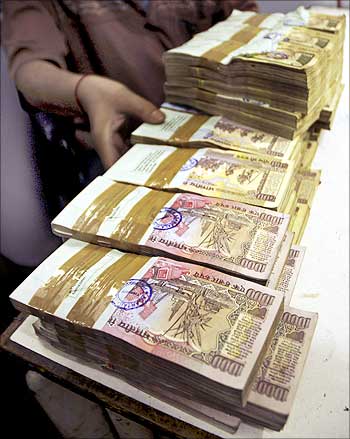
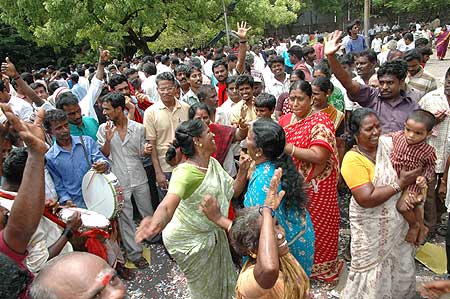
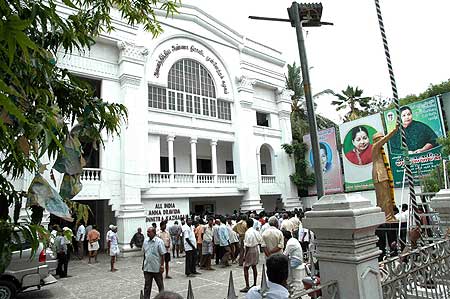
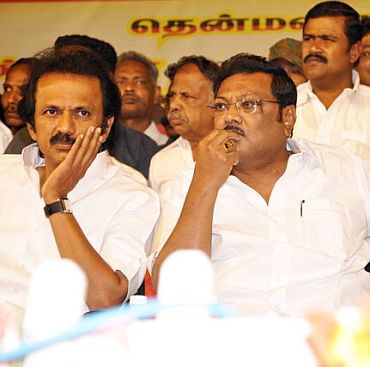
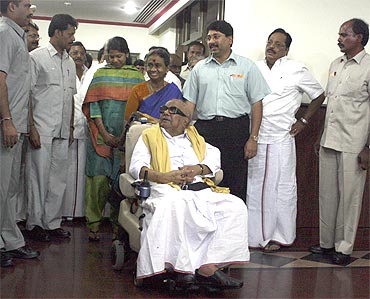
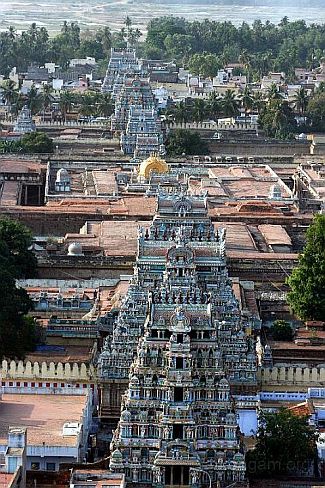

article